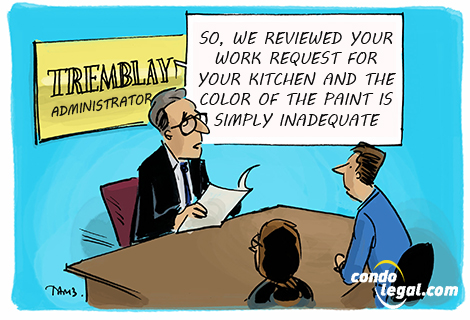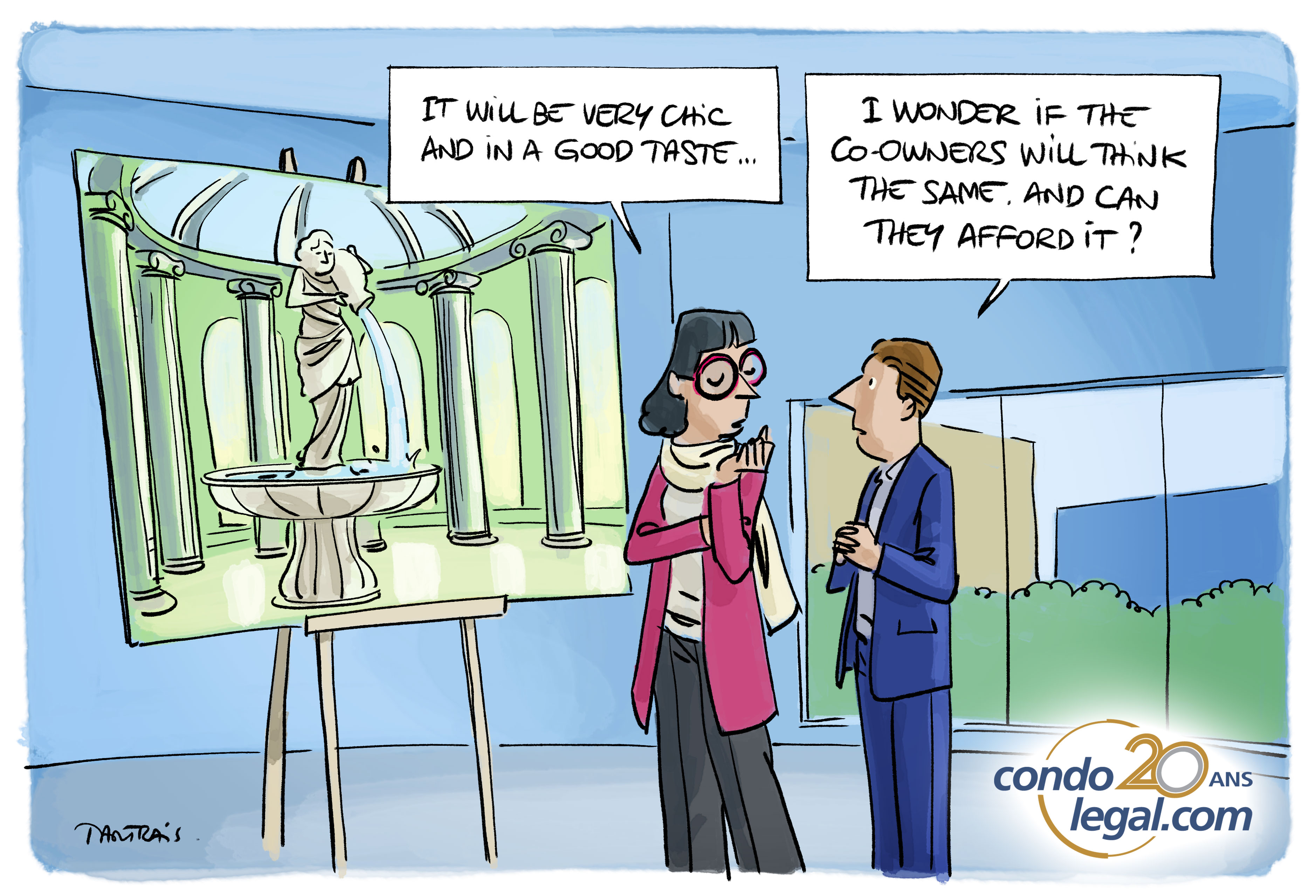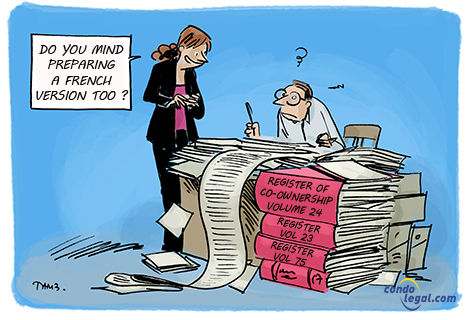
In a co-ownership setting, certain renovations or modifications made by a co-owner may impact the common portions, necessitating specific procedures and approvals. When the work of a co-owner has an impact on the common portions, the latter must obtain authorization from the meeting of co-owners to have it undertaken, even if the work is carried out in his private portion. This authorization requires a vote, the majority of which is greater than that required for the current decisions. Failure to comply with this rule could result in a co-owner being ordered to restore the premises to their original state or even to pay damages.
Nature of the work concerned: a few examples
Work engaged by a co-owner that affects the common portions is more common than we think. They can result in:
Authorization system
If the work planned by the co-owner affects a common portion of the immovable, a specific process must be followed. For example, he will have to ask the authorization of the general meeting of co-owners to have them carried out, even if the co-ownership were to consist of only two fractions. He will also be responsible for requesting that a supplementary item be included on the agenda of the meeting of co-owners, specifying the nature and scope of the proposed work.
It should be recalled that the board of directors does not have the legal capacity to authorize work of this nature. If it assumes this right, this authorization would have no legal value. It could even engage the civil liability of the syndicate and the directors.
Required majorities
The prior authorization by the meeting of co-owners is subject to a reinforced majority [at least three-quarters (75%) of the votes of the co-owners present or represented], pursuant to article 1097 of the Civil Code of Québec.
Furthermore, if such work affects the destination of the immovable, for example work that has an impact on the architectural harmony of the building. it would then be subject to a double majority vote (i.e. three-quarters of the co-owners representing at least 90% of the votes of all co-owners), pursuant to article 1098 of the Civil Code of Québec.
If the work has the effect of changing the relative value of the private portions, or a number of them, a recalculation of the relative value of the affected fractions should be made. This would be the case, for example, if the meeting allowed a co-owner to have expansion work undertaken in his private portion, thus allowing a bathroom to be installed within the common portions.
The meeting could request this recalculation, which would be conditional on the authorization of this transformation work. However, any revision of a relative value has a direct impact on the allocation of common expenses, since article 1064 of the Civil Code of Québec imposes a method of allocation based on the relative value of each lot.
Posteriori ratification
If prior authorization to start work must (in principle) be given, the general meeting of co-owners nevertheless has the power to ratify them after the fact, even if they have been started without permission. This can be done by means of a regularisation "a posteriori", conditional on the parameters established by the declaration of co-ownership. That said, it is not recommended to act without prior authorization, in terms of work, under penalty of being fined under a penal clause - which could have been provided for in the declaration of co-ownership - or even to be required to restore the premises to their original state.
 WHAT YOU SHOULD KNOW! The general meeting may require a co-owner to comply with certain standards before the work he plans is undertaken. For example, their supervision may be required. It will then be up to the board of directors to verify, or have the work supervised, to ensure that it is carried out in accordance with the standards in force.
WHAT YOU SHOULD KNOW! The general meeting may require a co-owner to comply with certain standards before the work he plans is undertaken. For example, their supervision may be required. It will then be up to the board of directors to verify, or have the work supervised, to ensure that it is carried out in accordance with the standards in force.
 WHAT TO KEEP IN MIND: The integration of a section of common portions into a private portion requires an amendment to the declaration of co-ownership. This integration may result in increasing the relative value of the unit. Any revision of a relative value has a direct impact on the allocation of common expenses. Consequently, article 1064 of the Civil Code of Québec imposes a method of allocation according to the relative value of each lot.
WHAT TO KEEP IN MIND: The integration of a section of common portions into a private portion requires an amendment to the declaration of co-ownership. This integration may result in increasing the relative value of the unit. Any revision of a relative value has a direct impact on the allocation of common expenses. Consequently, article 1064 of the Civil Code of Québec imposes a method of allocation according to the relative value of each lot.
 WARNING! The exclusive right of use that a co-owner may have in a common portion, for example a balcony, is not a property right, but a private right of use attached to a private portion. The co-owner who enjoys it cannot: neither appropriate this common part by the construction of a work, nor even undertake work on this common portion without authorization of the general meeting of co-owners.
WARNING! The exclusive right of use that a co-owner may have in a common portion, for example a balcony, is not a property right, but a private right of use attached to a private portion. The co-owner who enjoys it cannot: neither appropriate this common part by the construction of a work, nor even undertake work on this common portion without authorization of the general meeting of co-owners.






